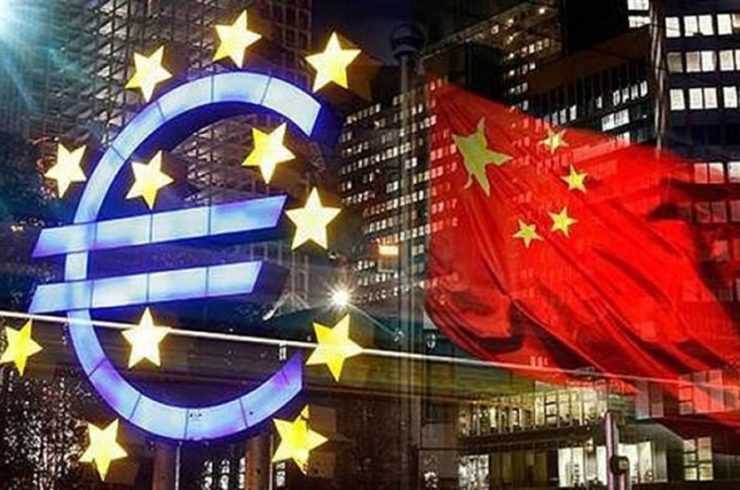Despite stating otherwise, the European Union has increasingly turned towards restricting trade relations with China. This is not due simply to China’s support for Russia in the ongoing US- and NATO-backed military conflict in Ukraine but the pressure Washington has been putting on the EU to ‘regulate’ its trade ties with China in order to restrict Beijing’s rise to global economic supremacy and protect Washington’s interests.

The EU’s Trade War on China
European Commission President Ursula von der Leyen is particularly known for her anti-China position. She was recently re-elected to lead the EU as its president until 2029. During her previous tenure, the EU saw many legal instruments developed to ‘oversee’ and ‘regulate’ trade ties with China, mostly on the same lines as in the US. One of these, for instance, is the ‘Foreign Subsidies Regulation’, which began to be applied to trade with and investment of China from July 12, 2023, onwards. The purpose of this regulation is to ensure “fair competition” by checking the undue advantage that the recipients of these subsidies (e.g., Chinese companies) bring to the European market, consequently outbidding local companies. In addition, the EU’s International Procurement Instrument – which entered into force in 2022 – gives the commission the authority to block investment by companies funded by non-EU governments and cut businesses out of procurement contracts if their home market is closed to EU bidders. This is even though China itself has already passed regulations to open its economy to foreign investors. This is in addition to how the EU is expanding its current sanctions on Russia to include Chinese companies working with or in Russia.
What Does it Mean for Economic Growth in the EU?
Reports indicate that this ‘war’ on China is unlikely to bring any concrete benefits to Europe. In fact, the restrictions have already led to a visible decline in Chinese investment in Europe, taking it to the lowest levels since 2010. If this trend continues, it will only worsen the health of the economy in Europe, which has been stagnant at best since the past decade or so. Should the EU continue to target China? It makes no sense. Consider this:
The EU’s import dependence on China is 90% or higher for certain pharmaceuticals, chemicals, and raw materials. In addition to this, most of the EU’s dependence on China for other types of materials and products, such as magnesium, permanent magnets, photovoltaic cells, and certain antibiotics and hormones, have no substitutes. Were the EU to continue to blindly the US in its footsteps, it would only shoot itself in the foot.
Will Europe Shoot Itself in the Foot?
With Ursula again in power, she is most likely to continue with the trend she herself set in the past five years. In addition to this, the recent rise of far-right parties – in France as well as in Germany, Italy, the Netherlands, and elsewhere in Europe – has caused no small amount of political tensions. More importantly for the health of the economy, these victories mean that the EU is taking a political turn that might not be qualitatively different from Donald Trump’s stance on trade with China.
Where this might change is the victory of Kamala Harris in the US elections in Europe. The far right in Europe is not simply radically conservative vis-à-vis immigrants; it also especially emphasises strategic autonomy from the US. Were Trump to win, far-right parties in Europe would benefit insofar as they would have a like-minded in the White House who is never keen to pay American taxpayers’ money to protect European security. The European far-right – which seems to have a more inward, nationalist disposition – might also see in Donald Trump an ally tackling China. Were Harris to win, however, while she might continue Biden’s war on China, she is unlikely to offer the European far-right an easy choice to adopt ‘strategic autonomy’ and get rid of NATO. In this case, whether European far-right parties – who would still be led by an anti-China president – will ally with Harris’ anti-China position or not will be a moot question.
To some extent, the decision might come down to China’s own approach to Europe’s new political realities. As reports indicate, Beijing is already taking appropriate steps to court these parties. In the event of Beijing succeeding in laying down mutually agreed ground rules of trade, the EU’s far-right might not adopt an openly anti-China stance. This will put Harris in a tight spot insofar as she may ultimately have to offer the EU some strategic autonomy in exchange for its support for Washington’s own ‘trade war’ on China. Still, were Trump to win, we might still see EU states developing economic ties individually with China. There is, in other words, an interesting twist to both transatlantic ties and their common or divergent outlook vis-à-vis China.
Salman Rafi Sheikh, research analyst of International Relations and Pakistan’s foreign and domestic affairs, exclusively for the online magazine “New Eastern Outlook”
